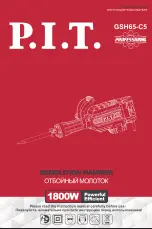
7
Next, repeat with one full length pull in the
right
slot of Stage 1. (See Figure 4)
Note: Each time you insert the blade, simultaneously pull the blade toward you. Never
push the blade away from you.
Apply just enough downward pressure to make contact
with the wheel – added pressure does not speed up the sharpening process.
To insure uniform sharpening along the entire blade length, insert the blade near its
bolster or handle and pull it at a steady rate until it exits the slot. Always make an equal
number of pulls alternating one pull in the left slot and then one pull in the right slot
in order to keep the edge facets symmetrical. Generally in Stage 1 you will find that
only three to five pairs of slow pulls is adequate, but for a duller knife more pulls will
be needed.
Before moving to Stage 2 you will find it very important to confirm that a burr (see Figure 5)
exists along one side of the edge. To check for the burr, move your forefinger carefully
across the edge as shown. (Do not move your finger along the edge – to avoid cutting
your finger). If the last pull was in the right slot, the burr will appear only on the right side
of the blade (as you hold it when sharpening) and vice versa. The burr, when present,
feels like a rough and bent extension of the edge; the opposite side of the edge feels
very smooth by comparison.
If no burr exists, make one or two pairs of additional alternating pulls in the left and right
slots of Stage 1 before proceeding to Stage 2. Slower pulls will help you develop the
burr. Confirm the presence of the burr after a pull in the left slot and then also after a pull
through the right slot before proceeding to Stage 2.
It is always necessary to create
the burr in Stage 1 before honing in Stage 2.
Figure 4. Inserting blade in right slot of Stage 1.
Blade Edge
Figure 5. Develop a distinct burr along knife edge
before honing in stage 2. Burr can be detected by
sliding finger across and away from the edge.
Caution! See text.






























